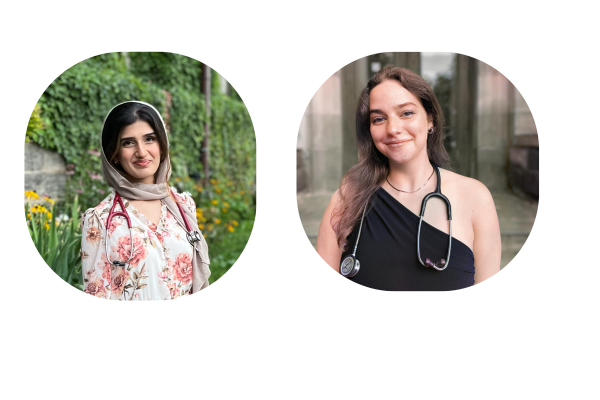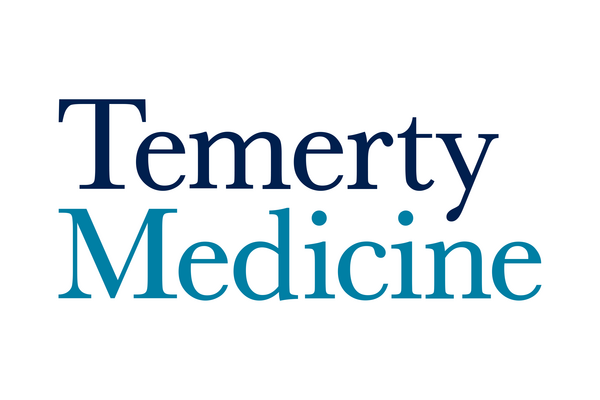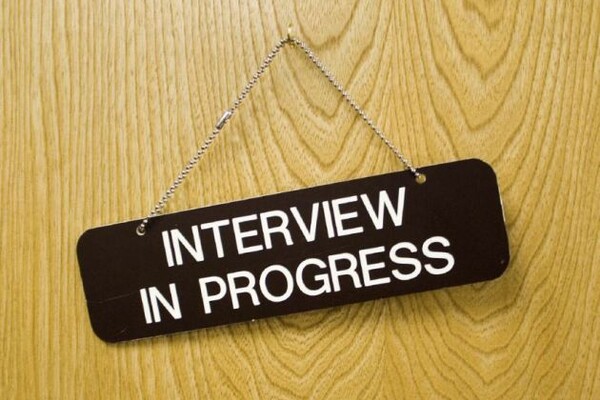Main Second Level Navigation
Get to Know our Admissions Student Representatives

1. What motivated you to apply for the Admissions Student Representative position, and how do you plan to use this role to assist prospective students?
Afreen Ahmad: I am honoured to receive this position and have wanted to make an impact on medical admission since my days as a premedical applicant. Applying and interviewing for medical school multiple times gave me an appreciation for how daunting and emotionally draining the process can be, especially when not met with the ideal outcome. My goals for this role include supporting applicants and re-applicants through sharing my story and improving access to information for all applicants.
Danielle Tsirulnikov: My family and I immigrated to Canada when I was 10 years old. As the eldest sibling and the first person in my family to pursue medicine in Canada I found it extremely difficult to find support. When I was first applying to university, my parents did not even know where McMaster was, or most undergraduate programs here. Fast forward four years, and I was still the only person in my family trying to get into the medical field. I felt like there was no one to guide me. My parents did their best to support me as they could through all my extracurricular activities, and instilled in me a passion for sports, music, and reading. After a couple of attempts, I ended up getting into the program of my dreams.
This experience made me realize that there are likely hundreds of other applicants just like me – people who are struggling to find supports. As student representative for the Admissions Committee, I hope to promote inclusive initiatives that ensure equitable opportunities for underrepresented groups. I hope that by starting initiatives to provide immigrants and those who do not have mentors with someone to guide them.
2. Can you share your own personal journey through the medical school application process, including any challenges you faced and how you overcame them?
AA: I moved from Pakistan at 13 years old and had difficulty navigating the system, especially since I didn’t have anyone who worked in healthcare in my family. This proved challenging in terms of access to resources and information about the healthcare system in Canada. I overcame this by asking anyone who would be willing to help for guidance. This built a strong foundation of resilience as I realized you must be brave enough to seek help.
Moreover, I went through the application cycle multiple times, including interviewing at UofT three times. I improved my interviewing skills by taking time after each cycle to deeply reflect on myself, my articulation and organization, and my stories. With support from my peers and mentors, I diligently worked on presenting my best self and showcasing my strengths to the interviewer and have successfully made it to the other side.
DT: When it came time to apply to medicine, I felt so lost and alone drudging through all the requirements, writing (and re-writing) the MCAT, and trying to somehow fit all my life experiences into 150 characters. Although my parents did their best to try to get me connections from family friends – my only connection was from their plumber’s son who apparently goes to UBC. I had some incredible friends along the way who were applying with me, but it felt like most of them had someone to help them through this process, while I did not know who to even ask for help.
I unfortunately did not end up getting in on my first try, but instead ended up pursuing a Master of Physiotherapy. I decided to take some time to work as a Registered Physiotherapist prior to applying again. This time I finally got into U of T Medicine. It was hard not to feel like I was “behind” some of my peers, who at this point were already starting residency. However, I realized that through my journey I learned so much about being a clinician, how to ask for help, and about myself as a person. Looking back now I would not change any of it.
3. What advice would you give to prospective applicants who are just beginning to consider a career in medicine and are starting the process of exploring medical school options?
AA: Do not be afraid to put yourself out there! It can seem like a lot to apply, with different schools requiring different courses, essays, activities etc. However, if you are eligible for even one school and have the financial means, I would encourage you to apply. Each application cycle and interview cycle is a learning experience and you only need one acceptance.
If you don’t succeed and after some reflection you truly know this path is meant for you - it’s not a matter of “if” but “when”. I recall talking to one colleague who applied several times before they got accepted! At the end of the day, there are many pathways to get to the same destination and I would encourage you to talk to those who have successfully entered medical school and hear their stories.
DT: I would tell prospective applicants that there is no one “right” way to get into medicine. We hear about people doing all sorts of extracurricular activities just to fill their resume. Instead, I would say do the things that you are passionate about – whether it is playing trombone, painting, playing rugby. Whatever it is that you love to do will shine through when you are applying to medicine. Think of it as quality over quantity – being dedicated to a hobby or a club for 4 years is much more meaningful than being involved in 20 different clubs for 2 months.
Reach out to mentors or those who have already gone through the process to get their advice, and if possible, to edit/read through your application. This is easier said than done, but you would be surprised how many people are willing to help you if you just ask.
4. Reflecting on your experiences, what are the key lessons you've learned that you would like to pass on to prospective applicants who are just starting their journey in the medical field?
AA: Lessons I’ve learned through my pre-med journey include:
- Take courses you’re interested in but also be mindful of your GPA. Sometimes the “difficult” courses can come easy for you if you’re passionate about them.
- Get involved in your community and take advantage of the diversity of experiences and opportunities offered to you.
- Take risks and follow your passions, especially the ones that seem “unusual” for a pre-med. They help you be uniquely you and stand out.
- Take initiative in seeking mentorship and support.
- Make friends along the way. Some of the closest friends I’ve made have been during application seasons. A supportive environment can do wonders for your application and well-being.
- Get lots of feedback on your application and know when to trust your own gut. You won’t know who will read your application and how it might sound to someone who doesn’t know you so it may be helpful to ask different people to give feedback. However, remember that everyone has a different perspective, and you know how to tell your story best.
- DT: A key lesson that I learned from my own experience is that it might take a few tries to get in, but it does not mean you should give up. I was surprised when I spoke to many of my peers how many of them did a master’s degree, took a gap year, or worked/volunteered. I believe these experiences make you a better physician in the long term.
- Be open to trying new experiences, even ones that you do not think are necessarily related to medicine. They can help you grow as a person and become a more well-rounded clinician.
5. How do you balance the rigorous academic demands of medical school with your personal interests and well-being, and what advice would you give to incoming students on maintaining a healthy balance?
AA: Balance between academics and personal interests/well-being are key to preventing burnout. In fact, these activities are a much needed break from the rigorous academic demands of medical school. I’ve found being involved in the arts has helped me immensely, especially through the intersection with medicine, such as in the medical humanities.
One of my most memorable experiences from 1st year was hosting an improv workshop called “improv in medicine” with Dr. Ariel Lefkowitz where he shared that improv was one of the most important things he learned that made him a good physician. Similarly, for me, the arts have been therapeutic in their own right but funnily enough, have improved my clinical skills and ability to empathize with patients. I would encourage applicants to continue interests that feed their soul and perhaps even reflect on how these activities have helped them grow as a future health care worker, but more importantly as a human.
DT: The thing with medical school is it always feels like there is something more to do – another self-learning module to do, knock out 200 Anki cards, do some research. If you let it take up all your time it will. Medicine can be all-consuming and that is why we see so much burnout. That is why it is so important to prioritize your own health and well-being. We are in this for the long term – this is a marathon not a sprint. This is something I have also been trying to work on, but since first year I have been attempting to consistently go to the gym at least 3 times per week. I also got into running with my friends last year. So, try something new, do a new intramural with your classmates, go on a run with your roommates, try out the Hart House classes. I promise it will make you a much better medical student and you will meet new people and make friends along the way.
Moving out can also be tough – being away from your parents for the first time. Learning how to cook can be challenging but also really rewarding. I find that cooking with my partner, learning new recipes from my roommates, and meal prepping every week has been a game changer for me. We learn as medical students how important diet and exercise are, but somehow, we tend to forget to apply that rule to ourselves. We must strive to be healthy both for ourselves, and as a role model to our patients. It is possible to be healthy while being busy.


